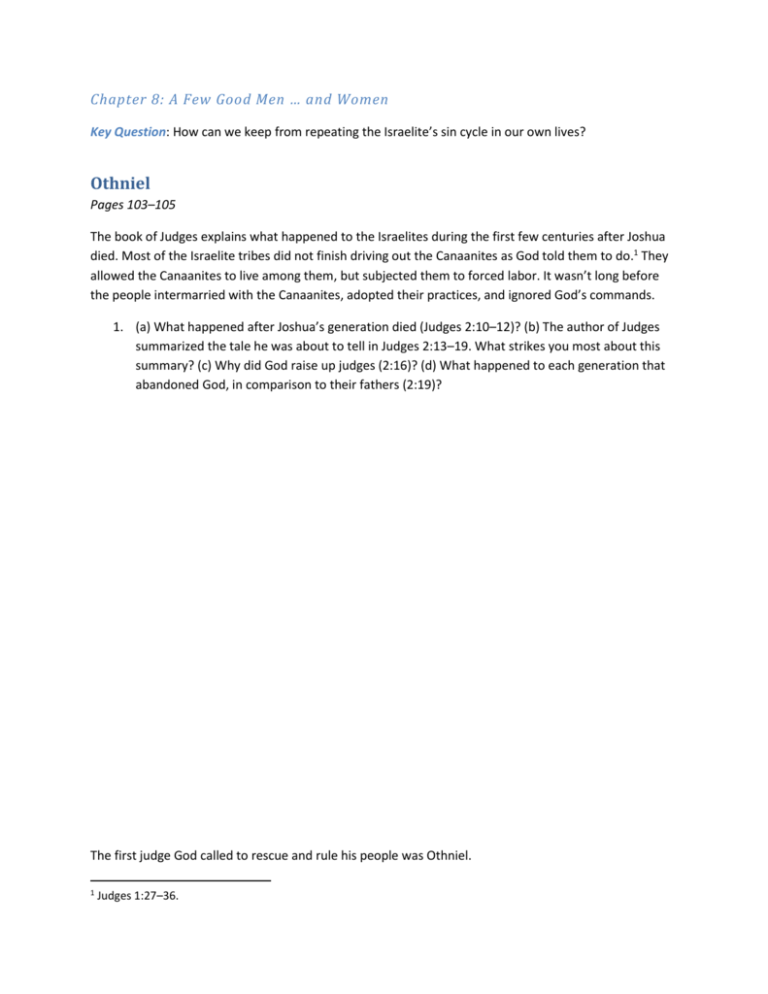Chapter 8
advertisement

Chapter 8: A Few Good Men … and Women Key Question: How can we keep from repeating the Israelite’s sin cycle in our own lives? Othniel Pages 103–105 The book of Judges explains what happened to the Israelites during the first few centuries after Joshua died. Most of the Israelite tribes did not finish driving out the Canaanites as God told them to do.1 They allowed the Canaanites to live among them, but subjected them to forced labor. It wasn’t long before the people intermarried with the Canaanites, adopted their practices, and ignored God’s commands. 1. (a) What happened after Joshua’s generation died (Judges 2:10–12)? (b) The author of Judges summarized the tale he was about to tell in Judges 2:13–19. What strikes you most about this summary? (c) Why did God raise up judges (2:16)? (d) What happened to each generation that abandoned God, in comparison to their fathers (2:19)? The first judge God called to rescue and rule his people was Othniel. 1 Judges 1:27–36. 2. (a) What did the Israelites do in Judges 3:7? (b) What was God’s response (3:8)? (c) What did the Israelites do next (3:9a)? (d) What was God’s response (3:9b–10)? (e) What happened to the land as a result (3:11)? This cycle repeats throughout the book of Judges, which covers the time period between the taking of the land and the first king (called the “premonarch period” in the chart below). Over and over, Israel abandoned God and began doing evil, particularly by worshipping Canaanite gods, participating in the highly sexualized Canaanite worship practices, and oppressing the weak. God punished them by no longer protecting them and by delivering them into the hands of their enemies. The Israelites groaned under their hardship and cried out to God. God relented and gave them a judge who delivered them. But when things got good, the people once again committed apostasy by abandoning the true God for false gods. The New American Commentary charts it like this:2 2 Diagram from Daniel I. Block, New American Commentary—Volume 6: Judges, Ruth, (Nashville, TN: Broadman & Holman, 1999), WORDsearch CROSS e-book, 133. 3. (a) The Israelites turned to God when they were afflicted and oppressed, but left him when life was good. What does this suggest about the type of relationship they desired to have with God? (b) What would you think about a friend who treated you well only when he or she wanted something from you? (c) Do you find yourself spending more time with God when you want something badly from him? Why or why not? (d) What practices could you implement to be sure you don’t seek God only when you want something from him, but rather have a true relationship with him? Deborah Pages 105–107 After a couple more judges, the Israelites had peace for eighty years. 4. (a) After this time of peace, what happened (Judges 4:1)? (b) If the Israelites had driven out the Canaanites, would they have fallen to a Canaanite king from within their midst (4:2)? (c) What happened under Sisera, the commander of a Canaanite army (4:3)? (d) How can allowing “small” amounts of sin to stay in our lives lead us to be enslaved and oppressed by that sin? Out of compassion, God raised up another judge: the prophetess Deborah. 5. According to Judges 4:4–5, what positions did Deborah hold? 6. In what ways did Deborah and Jael show courage? Gideon Pages 107–112 The Israelites continued their cycles of abandoning God whenever life seemed good. Eventually they fell under the oppression of the neighboring Midianites.3 7. (a) What did God do when the Israelites cried out to him (Judges 6:7–8a)? (b) Was God unable to deliver them (6:8b–9)? (c) Why had God allowed Midian to oppress them (6:10)? 3 The Midianites were not Canaanites. They were the descendants of Abraham through Keturah, whom he married after Sarah died. The angel of the Lord appeared to an unlikely hero named Gideon. 8. (a) Despite the prophet’s explanation for the Midianite oppression, what did Gideon ask the angel of the Lord (Judges 6:13)? (b) Why do you think Gideon didn’t accept the prophet’s explanation for their oppression (see previous question)? (c) If possible, give a modern day example of someone disobeying God and then wondering why God allowed unpleasant consequences (please do not give names). Gideon didn’t consider himself a mighty warrior, yet God chose him. 9. Why do you think God often uses “weak” people to accomplish mighty things4 (Judges 6:15)? 10. (a) Why did God reduce Gideon’s army from 32,000 men to 300 (Judges 7:2, 7)? (b) What do you think God wanted to teach the Israelites through this? 4 See also 1 Corinthians 1:27–29. God worked a mighty victory and freed the Israelites from Midian through Gideon and his three hundred men. The land had peace … until Gideon died. Samson’s Rise Pages 112–116 The cycle repeated, with each rebellious generation becoming more corrupt than all those before. Even some judges followed the practices of the people among whom they lived, as was the case with Samson. The angel of the Lord appeared to Samson’s parents in the midst of forty years of oppression under the Philistines.5 He said Samson was to be set apart from birth for God’s service.6 11. What commands did the angel of the Lord give regarding how Samson was to live (Judges 13:5)? Despite his calling, Samson didn’t take seriously God’s commands not to marry those who didn’t worship the Lord God.7 12. In what ways did Sampson’s chasing after foreign women illustrate Israel’s chasing after foreign gods? Samson delivered the Israelites from the Philistines, but his confidence in his own strength left him seeing no need to rely on God’s strength. That led to his downfall. Samson’s Downfall Pages 116–119 5 The Philistines migrated to Canaan from the Aegean and also wanted to occupy Canaan. Samson was to be a Nazirite. People could take Nazirite vows for short times, such as thirty days. Samson, John the Baptist, and perhaps Samuel were called to be lifelong Nazirites. 7 Deuteronomy 7:3–4. 6 Samson continued to chase women who worshipped other gods. Eventually he fell in love with Delilah, and the Philistine rulers saw their opportunity. They bribed Delilah to find out the secret of Samson’s great strength. Delilah tried her best. Each time Samson told her how to subdue him, she waited until he slept and tested what he told her. Samson treated her attempts like a game. One day, though, he told her his hair had never been cut because he was a Nazirite dedicated to God, and if she shaved his head, he would become as weak as any other man. Samson knew Delilah would shave his head, but he didn’t know the Spirit of the Lord would leave him as a result. 13. (a) What might be reasons Samson told Delilah she could weaken him if she shaved his head, even though he knew she would attempt this deed which was forbidden to him? (b) Samson’s strength wasn’t in his hair; what was the true source of Samson’s strength (Judges 16:20)? (c) What were ways Samson took the Source of his strength for granted? (d) How can Christians keep themselves from taking God for granted? As the hair which was the outward sign of Samson’s dedication to God left him, so did the Spirit of the Lord. Samson discovered too late his strength depended on God’s presence. The Philistines gouged out Samson’s eyes, bound him in shackles, and imprisoned him. One day the Philistine rulers and three thousand people gathered on the temple roof to mock Samson and celebrate their god having delivered Samson into their hands. As Samson leaned against the temple’s supporting pillars, he prayed. 14. (a) What did Samson’s prayer show he now understood about his strength’s source (Judges 16:28)? (b) What lessons can we learn from Samson about the gifts God gives us for serving him and helping others? (c) What can we learn from Samson about additional reasons God uses the weak more than the strong? God had called the Israelites to be his people and to make him known to the surrounding peoples. But many Israelites let the culture influence their ideas of right and wrong, rather than God’s commands given through Moses. The differences between Canaanites and Israelites diminished. 15. (a) In whose eyes were the peoples’ actions considered evil (Judges 2:11)? (b) In whose eyes were the peoples’ actions considered right (Judges 21:25)? (c) What steps can we take to be sure we’re doing right in God’s eyes, and not just our own? 16. What steps can we take to keep from repeating the Israelite’s sin cycle in our own lives? Both Moses and Joshua warned the Israelites that if they didn’t drive out the inhabitants, then they would be seduced by their evil practices; if they did, God would drive the Israelites out too. Sadly, the Canaanization of Israel marched on. But all was not lost. Some Israelites still wanted to follow God in the Promised Land. They mourned over the depths of Israel’s sin and committed themselves to obeying God’s commands. We’ll see faithful God followers shine in this dark era next week as we watch God make himself known.






